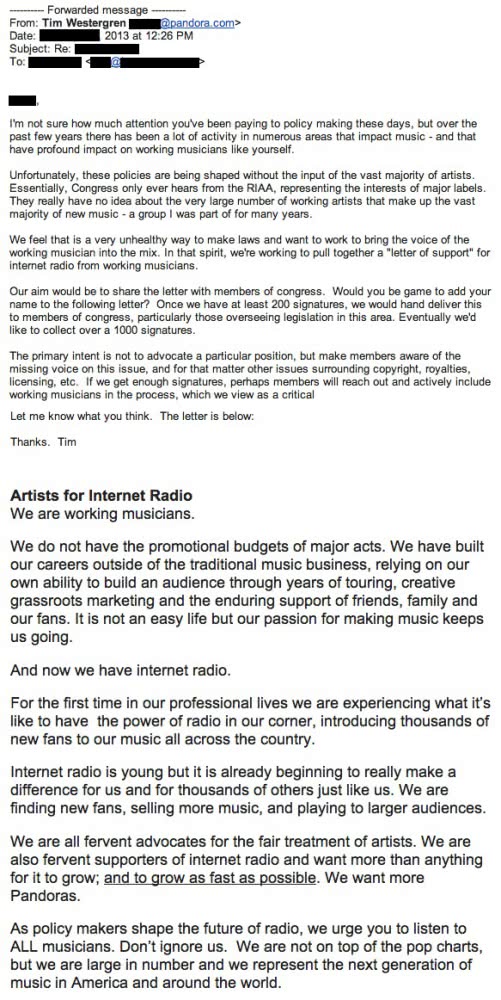Internet radio service Pandora has been bearing the brunt of anger from musicians, writers, and publishers concerned over attempts to further erode royalty payment rates which are already at alarmingly low levels.
Pandora has been pressuring the US congress to change laws and lower their royalty rates by up to 85%. An attempt last year to lower the royalties was met with almost universal condemnation. Now Pandora are looking to shore up support from the music community to take to the congress and use as leverage to lower the royalties.
So how low are Pandora’s rates already? Pretty darn low. David Lowery, a US-based songwriter and frontman for Cracker, recently revealed just how low they are.
According to Lowery, for over one million plays of Cracker’s song ‘Low’, as songwriter all he got paid was a measly $16.89. To be fair, Lowery only owns 40% of the song but even then Pandora would only have paid $42.23 for the right to play the song one million times to its users.
Pandora isn’t alone when it comes to alarmingly low royalty cheques either.
Lowery’s song got played 116,260 times on Spotify for which he received $12.05, and 152,900 times on Youtube, for which he received $1.95
Youtube’s royalty came out the lowest of the bunch, equating to about .009 of a cent per play, but of course music is not the primary product of Youtube, now the world’s largest video streaming service.
By comparison, satellite radio operator Sirius XM paid Lowery $181 for 179 plays of his track. Terrestrial radio fared better too, paying close to $14,000 for just under 19,000 spins.
“Soon you will be hearing from Pandora how they need Congress to change the way royalties are calculated so that they can pay much much less to songwriters and performers,” wrote Lowery. “Here’s an idea. Why doesn’t Pandora get off the couch and get an actual business model instead of asking for a handout from congress and artists?”
But why would musicians ever agree to lower royalties when the cheques generated from online streaming are already notoriously low? Because Pandora’s letter to musicians makes no mention of the royalty cut.

A chorus of artist are also making noise about Pandora’s campaign such as Roger Waters, David Gilmour, and Nick Mason, names you rarely see on the same team.
The famously fractured Pink Floyd have taken the extraordinary step of putting their differences aside, reuniting to write a scathing letter against the internet radio giant.
“Great music can inspire deep emotions, and businesses have long sought to harness this power in order to make money. Nothing wrong with that – everyone deserves to make a living – but too often it leads to less than scrupulous behavior,” they wrote.
“The latest example is how Pandora is pushing for a special law in Congress to slash musicians’ royalties – and the tactics they are using to trick artists into supporting this unfair cut in pay.”
“It’s a matter of principle for us. We hope that many online and mobile music services can give fans and artists the music they want, when they want it, at price points that work. Of course, this letter doesn’t say anything about an 85% artist pay cut. That would probably turn off most musicians who might consider signing on.”
“All it says about royalties is “We are all fervent advocates for the fair treatment of artists.” And the only hint of Pandora’s real agenda is the innocent sounding line “We are also fervent supporters of internet radio and want more than anything for it to grow.” The petition doesn’t mention that Pandora is pushing the growth of its business directly at the expense of artists’ paychecks.”
“Fine print is one thing. But a musician could read this “letter of support” a dozen times and hold it up to a funhouse mirror for good measure without realizing she was signing a call to cut her own royalties to pad Pandora’s bottom line.”
“We’re not saying that the music business is perfect or that there is no room to compromise. But tricking artists into signing a confusing petition without explaining what they are really being asked to support only poisons the well.”

































